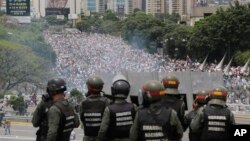Venezuela has large caches of weapons that are at risk of falling into the wrong hands, the head of the Central Intelligence Agency told a Senate panel Thursday, adding, "It's a real threat."
CIA Director Mike Pompeo shared that assessment at a Senate intelligence committee hearing. The restive South American country is in its second month of often-violent street protests, with at least 39 deaths resulting from clashes between its socialist government's supporters and foes.
Pompeo's comment came in response to a question from U.S. Senator Marco Rubio. The Florida Republican had asked about threats posed by "groups armed by the regime of Nicolas Maduro to defend him from the protests."
Rubio has suggested that these armed groups, called "colectivos," could sell arms on the black market to drug traffickers or terrorist organizations such as FARC — which recently ended decades of war with Venezuela's neighbor, Colombia — or the Lebanese militant group Hezbollah.
Pompeo acknowledged the threat but said the CIA had no evidence of contacts between terrorists and Venezuela's armed groups.
The groups' actions outside Maduro's control "do represent a risk, but we need more details," Pompeo said. "For now, we have no evidence that it is happening."
The CIA director said such collaborations most likely would have dangerous reverberations throughout the region.
Lost credibility
Dan Coats, director of national intelligence, told the Senate panel that Venezuela's "unpopular" government had lost its credibility after mismanaging its economy and stripping away some democratic norms. Maduro, who has jailed political opponents and delayed long-overdue elections, earlier this month called for a new constitution, fueling more anger among Venezuelans already bitter over severe and chronic shortages of food, medicine and other basics.
Venezuelan government security forces have used tear gas and rubber bullets to quell demonstrations.
"The unpopular and autocratic government of Venezuela will opt for more repressive methods to contain political opponents and discontent in the streets," Coats predicted.
The U.S. government has imposed sanctions on some individuals in Venezuela, including the country's vice president, related to suspected corruption and drug trafficking.
Last week, Secretary of State Rex Tillerson called the situation in Venezuela "a real tragedy" but said the U.S. government aimed for "working with others, including [in] interventions by others in Europe," to help resolve it.
Cuba and Mexico in focus
Given Venezuela’s flailing economy, the Maduro administration has cut back on providing discounted oil to allies. That figured into Cuba’s economy contracting by 0.9 percent last year.
Coats predicted Cuba’s Communist government would "focus on preserving control while managing a recession."
He said U.S. officials also expect the Cuban government will focus on maintaining political control while transitioning to an era without a Castro in power. President Raúl Castro announced several years ago that he would retire at the end of his current five-year term, which concludes in early 2018. He became president after his older brother, Fidel Castro, stepped down in 2008. The elder Castro died last November.
As for Mexico, U.S. intelligence authorities anticipate increasing political pressure on that government to combat crime and corruption as the 2018 presidential election approaches.
VOA's Spanish service prepared this report.











